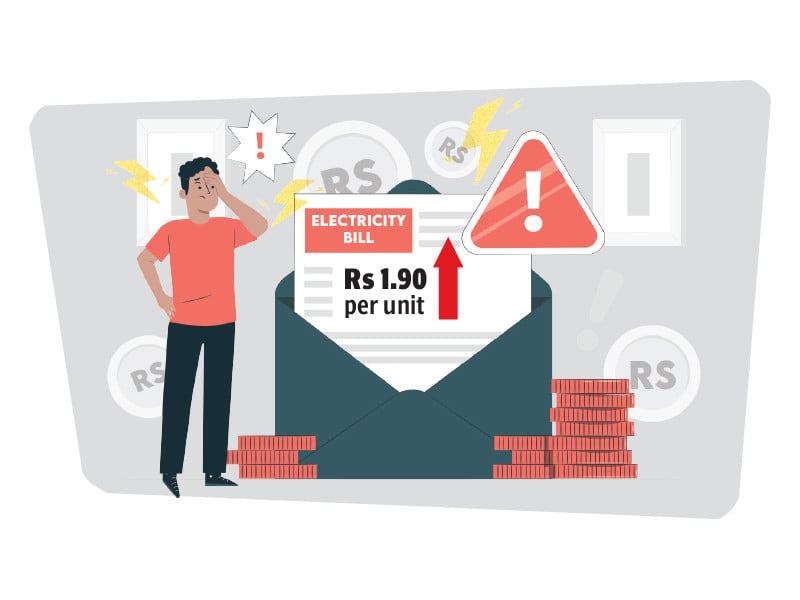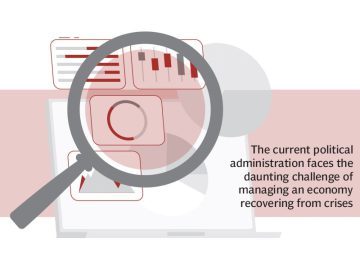ISLAMABAD:
The National Electric Power Regulatory Authority (Nepra) has approved an increase of up to Rs1.90 per unit in electricity tariff under quarterly adjustment for the fourth quarter of financial year 2023-24, which will result in an overall burden of Rs46 billion on consumers.
The amount will be recovered from consumers of state-owned power distribution companies (DISCOs) and private utility K-Electric.
Consumers are going to cough up billions of rupees primarily owing to lower electricity demand, reduced utilisation of maximum demand indicators (MDI) and aggregate technical and commercial (AT&C) losses-based load-shedding.
However, Nepra chairman claimed that consumers would get a relief of Rs1.80 per unit in electricity bills of September 2024. A public hearing was conducted by Nepra Chairman Waseem Mukhtar and members including Rafique Ahmad Shaikh, Mathar Niaz Rana, Maqsood Anwar Khan and Amina Ahmed.
The chairman requested media to highlight that despite the quarterly tariff adjustment, consumers would get a net relief of Rs1.80 per unit in September 2024 bills due to a Rs0.31-per-unit reduction in fuel charges adjustment for July 2024 and a Rs0.90-per-unit decrease in quarterly tariff adjustment for the third quarter.
Also, the impact of quarterly adjustment for K-Electric consumers will be borne by the government through a subsidy.
Nepra did not disclose details regarding the financial impact of AT&C losses-driven load-shedding or capacity payments made to the independent power producers (IPPs) for the unused booked capacity. Chairman Waseem Mukhtar pointed out that future tariff adjustments were likely to be minor and unlikely to significantly affect consumer bills if the current economic conditions persisted.
He stressed that they had made accurate estimate of the reference fuel cost; therefore, fuel charges adjustment was going to be reduced.
The chairman announced that there would be further relief in consumer tariff on account of fuel charges adjustment if Pakistan’s economic situation continued to remain the same. For the fourth-quarter tariff adjustment, Islamabad Electric Supply Company (Iesco) sought a total of Rs926 million, Lahore Electric Supply Company (Lesco) requested Rs3.995 billion, Gujranwala Electric Power Company (Gepco) Rs7.682 billion, Faisalabad Electric Supply Company (Fesco) Rs4.777 billion, Multan Electric Power Company (Mepco) Rs7.909 billion, Peshawar Electric Supply Company (Pesco) Rs674 million, Hyderabad Electric Supply Company (Hesco) Rs5.016 billion, Quetta Electric Supply Company (Qesco) Rs8.078 billion, Sukkur Electric Power Company (Sepco) Rs4.538 billion and Tribal Areas Electric Supply Company (Tesco) Rs3.210 billion.
The total amount of Rs46.805 billion to be recovered from consumers comprises Rs22.867 billion in capacity charges, Rs3.566 billion in variable operation and maintenance (O&M) costs, Rs7.513 billion worth of use-of-system charges and market operator fee, Rs11.067 billion for transmission and distribution (T&D) losses and Rs1.792 billion for net metering.
Nepra stated that uniform quarterly adjustments would also apply to K-Electric consumers as per the federal government policy. Member Rafique Ahmad Shaikh criticised DISCOs for denying the net metering facility, especially by Pesco, which earlier restricted net metering to 30% of the transformer load but “is now allowing 70%”.
It was also observed that Pesco was not consuming its full allocation to show lower maximum demand indicators.
Fesco reported an 8% reduction in sales due to the shift towards solar energy. Nepra member Mathar Niaz Rana suggested the imposition of penalties on DISCOs that underutilised their allocated capacity.
The regulator sought explanations from DISCOs regarding AT&C losses-based outages and announced that it would take action following completion of an ongoing inquiry.
Member Maqsood Anwar Khan requested detailed reports on the allocated and unutilised quotas from the National Power Control Centre. Nepra lashed out at officials of DISCOs for denying consumers the net metering facility. It emphasised that DISCOs should increase load if there were issues related to the excessive load on transformers.





